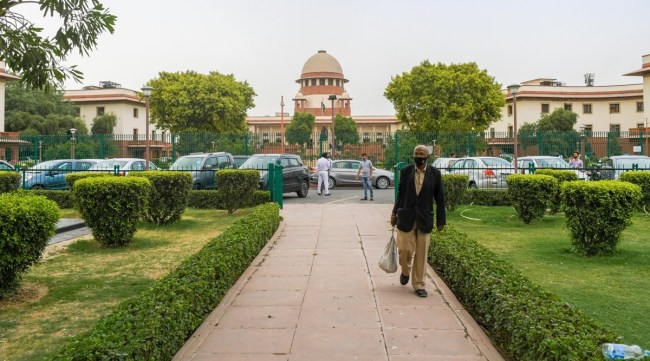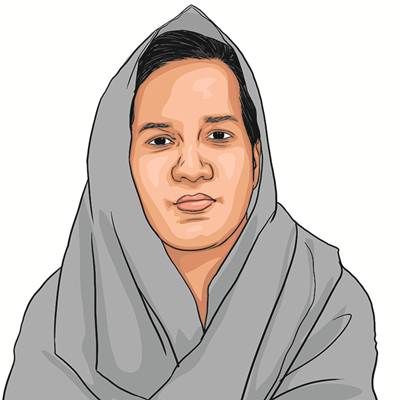Opinion The welcome message from Supreme Court: Not all women are cis-women
Conceiving the idea of a pregnant person as gender-neutral is a significant step forward in acknowledging the health and reproductive rights of transgender and gender diverse persons.
 While this was the crux of the judgment, the Court takes the opportunity to address many other important issues relating to safe abortion access. (File)
While this was the crux of the judgment, the Court takes the opportunity to address many other important issues relating to safe abortion access. (File) Written by Aqsa Shaikh and Raghavi Shukla
“The desire to have children is not attached to gender.”
– Ray Rachlin, midwife
The desire to love, conceive or care is not specific to any gender. Motherhood is an emotion that is essentially genderless. Yet, our society and legal system have always equated pregnancy with being a woman. No wonder, then, that a pregnant person in all our laws is referred to as a woman while we know that there are transgender men, non-binary persons, intersex people, and many other gender-diverse persons who can and do experience pregnancy. In our system, which criminalises abortion in general and only allows termination of pregnancy when certain conditions are met, non-women pregnant persons find it legally untenable to access safe and dignified abortion services.
The “times they are a-changin” and our laws need to evolve and be interpreted to accommodate the changes and diversities in our society. Thanks to the judgment in NALSA v the Union and Transgender Persons (Protection of Rights) Act 2019 and Rules 2020, transgender persons are legally recognised as a separate gender with protection against discrimination. However, these verdicts and enactments alone are insufficient to bring about true inclusion in our current legal system, which is built on the architecture of binary systems of sex and gender.
In this context, the Supreme Court’s judgment arising out of the special leave petition regarding the Medical Termination of Pregnancy Act is a landmark one. Coinciding with International Safe Abortion Day, this judgment — with a range of observations and orders — makes abortion more inclusive. The three-judge bench consisting of three cis-gender men mentioned this in the order delivered by Justice D Y Chandrachud: “Before we embark upon a discussion on the law and its application, it must be mentioned that we use the term ‘woman’ in this judgment as including persons other than cis-gender women who may require access to safe medical termination of their pregnancies.”
This is significant because the original Act of 1971, its amendment in 2002, and the Rules, all refer to persons seeking Medical Termination of Pregnancy as women, which was supposedly meant to refer to cis-gender women. The same term was continued in the 2021 amendment to the MTP Act which, however, made progress on abortion rights by increasing the gestational age limit for abortion and replacing the term “husband” with “partner”.
The NALSA judgment and the Transgender Persons Act 2019 were meant to provide constitutional rights to transgender persons, including the right to discrimination-free healthcare services. It may be worthwhile to note that though the Transgender Persons Act spoke of providing healthcare services to transgender persons, it focused mostly on general healthcare and gender-affirming care. The sexual and reproductive health of transgender persons including contraception, abortion, pregnancy, surrogacy, and assisted reproductive techniques do not even find a mention in the legislation. The subsequently enacted Surrogacy (Regulation) Act 2021 and Assisted Reproductive Technology (Regulation) Act 2021 only further excluded the queer community and transgender persons from availing of these family-building health services.
Globally too there has been growing conservatism around abortion rights with the overturning of Roe v Wade in the US. In this background, the Indian Supreme Court’s judgment with its spirit of holding high the rights to bodily integrity and bodily autonomy is a silver lining. While we celebrate this decision, it is important to have an intersectional lens when we look at abortion rights and services for transgender men and non-binary persons.
Transgender persons may also be minors, unmarried, or disabled persons including those with mental illnesses. In such cases, cognizance of these multiple intersecting identities — which may make access to safe and timely abortion even more challenging — must be taken.
We hope that the progressive steps taken by the Indian government and judiciary in increasing access to safe abortion for all persons, especially gender-diverse persons, do not just stop here but encompass all the necessary domains where liberal interpretation of legislation will help in securing health and equal participation in the society as a pregnant person or parent. After all, the issues of access to safe and legal abortion and affirming one’s gender identity are both linked to the basic human right of bodily autonomy and integrity.
Shaikh is an Associate Professor of Community Medicine at Jamia Hamdard and Shukla is a student at Campus Law Centre, University of Delhi.





